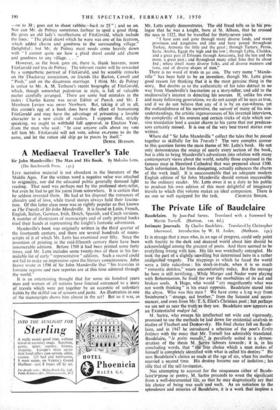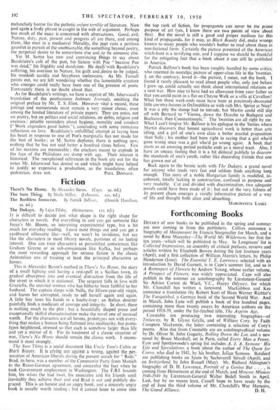The Private Life of Baudelaire
Intimate Journals. By Charles Baudelaire. Translated by Christopher
Isherwood. Introduction by W. H. Auden. (Methuen. 25s.) IT is strange that a man who, in an age of progress, could only point with finality to the dark and decayed world about him should be acknowledgeed among the greatest of poets. And there seemed to be everything wrong with him. His life was wretchedly entangled. He took the part of a slightly-mawilling but determined hero in a rather undignifted*-tragedy. The trappings in which he faced the world were a little ridiculous ; his stock-in-trade, when it is so much " romantic detritus," wears uncomfortably today. But the message he bore is still. terrifying. While Murger and Nadar were playing with Bohemianism, he fixed for ever the morbidities of its sad and broken souls. A Hugo, who would " cry magnificently what was not worth thinking " is his exact opposite. Baudelaire stared into the abyss. Who was this man ? We have come a It ng way from Swinburne's " strange, sad brother," from the Satanist and necro- mancer, and even from Mr., T. S..Eliot's Christian poet ; but perhaps we are not as near the truthas they are. Baudelaire now appears as an Existentialist malgre lui: M. Sartre, who sweeps his intellectual net wide and vigorously, promised to use the methods he laid down for existential analysis in studies of Flaubert and Dosfoevsky. His final choice fell on Baude- laire, and in 1947 he introduced a selection of the poet's Ecrits Intifnes with the essay that Mr. Turnell has admirably translated. Baudelaire, " le poete maudit," is peculiarly suited to a demon- stration of the thesis M. Sartre labours towards; it is, in his concluding words, that "th'e 'free choice which a man makes of himself is completely identified with what is called his destiny." He sees Baudelaire's choice as made at the age of six, when his mother married a second time. His destiny became one of isolation ; his role that of the self-tormentor.
Not attempting to account for the uniqueness either of Baude- laire'eprose or poetry, M. Sartre proceeds to wrest the significant from a well-documented life, so that he may dogmatically say that his choice of being was such and such. As an initiation to the splendours and miseries of Baudelaire, it is a work that inspires a melancholy horror for the pathetic enfant terrible of literature. Now pnd again a lively phrase is caught in the web of argument. Perhaps too much of the essay is concerned with abstractions. Good, evil, Nature, duty, past, present and progress all are there, and among them, like man in a mediaeval Morality, the poet runs a perilous gauntlet in pursuit of the unobtainable, the something beyond poetry, the perpetual desire to be somewhere else and to be someone else. Yet M. Sartre has new and convincing firings to say about Baudelaire's cult of the past, his liaison with Poe " because Poe was dead," his frigidity and dandyism. He dearS'with Baudelaire's suffering, his aversion to Nature, his guilt and,,desire to be judged, his monkish accidia and Sisyphean uselessness.- As Mr. Turnell points out, we are left wondering whether the lamentable creature who emerges could really have been one of the greatest of poets.
Fortunately there is no doubt about that. - As for Baudelaire's writings, we have a reprint of Mr. Isherwood's translation of the posthumous Intimate Journals, omitting the original preface by Mr. T. S. Eliot. However vital a record, these jottings and memoranda must remain a very minor classic, even among the limited literature of private papers. They are notes, not on poetry, but on politics and social relations, on debts, religion and enemies ; pitiable reminders about hygiene, morality and conduct (" Work engenders good habits "), concluding with some immature reflections on love. Baudelaire's unfulfilled attempt at laying bare his heart in response to one of Poe's marginalia has not made for the best of books ; as M. Sartre deplores, there is nothing new, nothing that he has not said better a hundred times before. Few of his maxims are memorable ; the crackers meant to explode in the face of the Philistines are damp with age. Their interest is historical. The unexplained references in the book cry out for the notes Mr. Isherwood has denied us and which might have helped to justify so expensive a production, as the translation, often



































 Previous page
Previous page